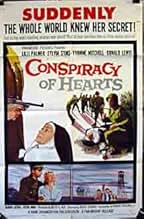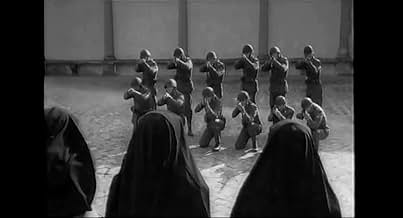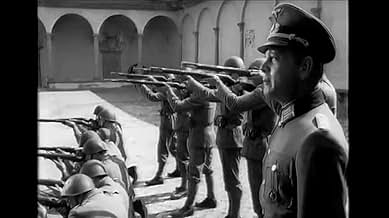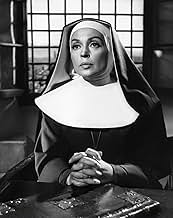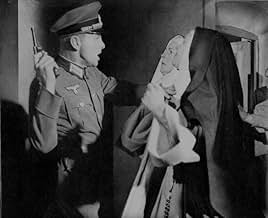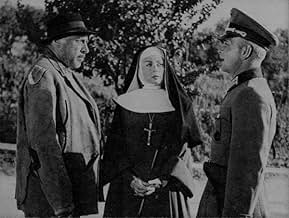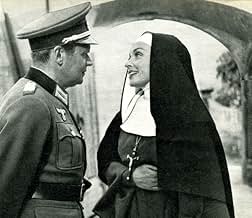VALUTAZIONE IMDb
7,1/10
588
LA TUA VALUTAZIONE
Aggiungi una trama nella tua linguaCatholic nuns risk their lives to help Jewish children in an Italian internment camp escape to Palestine during World War II.Catholic nuns risk their lives to help Jewish children in an Italian internment camp escape to Palestine during World War II.Catholic nuns risk their lives to help Jewish children in an Italian internment camp escape to Palestine during World War II.
- Regia
- Sceneggiatura
- Star
- Premi
- 1 candidatura in totale
Recensioni in evidenza
Towards the end of the second world war, an order of Italian nuns makes all attempts to secure the freedom of Jewish children held captive in a local concentration camp. However when the camp comes under the direct control of German troops, the Sisters' task becomes increasingly dangerous.
Combing elements of The Von Trapp Story and Black Narcissus, Conspiracy of Hearts is a surprisingly powerful depiction of the clash between faith and might, as Palmer's Mother Superior stands firm against Lieven's uncompromising Nazi Colonel. The question of conscience and commitment to duty is repeatedly explored, from the perspective of both nun and soldier - Mitchell's Sister Gerta fears and doubts the Holy Order's actions, Sims' novitiate Sister Mitya is forced to confront her feelings towards Lewis's Major Spoletti, who in turn must choose between military duty and moral salvation. The juxtaposition between Catholicism and Judaism is also fascinatingly explored as the Sisters struggle to comprehend the facets of a different faith.
Universally well-performed by the ensemble, as usual its the supporting performances that stand out - Yvonne Mitchell was a power-house actress and at the peak of her film career (shockingly she is all but forgotten now), and her transformation from angry doubter to selfless devotee is totally believable. In addition, Ralph Thomas coaxes extraordinary performances from his juvenile cast - Rebecca Dignam and Joseph Cuby are beautifully moving without being cutesy or maudlin (Hollywood child actors take note!). At the heart, Palmer creates a depiction of quiet strength, dignity and humour even if we could have coped with a little less lipstick and mascara!
Combing elements of The Von Trapp Story and Black Narcissus, Conspiracy of Hearts is a surprisingly powerful depiction of the clash between faith and might, as Palmer's Mother Superior stands firm against Lieven's uncompromising Nazi Colonel. The question of conscience and commitment to duty is repeatedly explored, from the perspective of both nun and soldier - Mitchell's Sister Gerta fears and doubts the Holy Order's actions, Sims' novitiate Sister Mitya is forced to confront her feelings towards Lewis's Major Spoletti, who in turn must choose between military duty and moral salvation. The juxtaposition between Catholicism and Judaism is also fascinatingly explored as the Sisters struggle to comprehend the facets of a different faith.
Universally well-performed by the ensemble, as usual its the supporting performances that stand out - Yvonne Mitchell was a power-house actress and at the peak of her film career (shockingly she is all but forgotten now), and her transformation from angry doubter to selfless devotee is totally believable. In addition, Ralph Thomas coaxes extraordinary performances from his juvenile cast - Rebecca Dignam and Joseph Cuby are beautifully moving without being cutesy or maudlin (Hollywood child actors take note!). At the heart, Palmer creates a depiction of quiet strength, dignity and humour even if we could have coped with a little less lipstick and mascara!
I worry that at some time in the not too distant future the extent of the evil perpetrated during the 1930s and 40s will be forgotten. Watch this film and remind yourself that unless all good people stand strong, every day and every hour, these sort of events will keep happening, over and over again.
In this shocking (certainly for 1960), depressing, heart-breaking, uplifting and surprisingly honest movie, we see that it is only through individuals taking personal responsibility for their actions that we can have any hope of building a world fit for our children.
When I see films like this, and read the positive response from reviewers on IMDb, I still have some hope for the future.
In this shocking (certainly for 1960), depressing, heart-breaking, uplifting and surprisingly honest movie, we see that it is only through individuals taking personal responsibility for their actions that we can have any hope of building a world fit for our children.
When I see films like this, and read the positive response from reviewers on IMDb, I still have some hope for the future.
Ralph Thomas and Betty Box belong so firmly to the tale of the British cinema's protracted postwar decline, and their output runs so much to cheerful mediocrity and worse, that it would be churlish not to salute this exception.
A film about a mixed European bag of nuns in sunny Italy, sheltering Jewish children from nasty German occupiers, could have easily wound up as sticky or preachy as a Hollywood movie of the week or after-school special "endorsed by the National Education Association". This production does quite a bit better.
To begin with, the couple took the commercially bold decision to shoot in dramatically suitable monochrome (Rank was very into Technicolor) despite the temptation of those gorgeous locations near Florence. Next, Rank's addiction to polyglot casts proves acceptable, since the nunnery and the Cahtholic church are multinational, as is the war situation: the convention of Colonel Albert Lieven talking in Teutonically accented English and others in Italianate English does not distract.
Thirdly, the cast is well chosen. Sylvia Syms, a rising English rose, was the novice. Michael Goodliffe was a familiar officer/vicar type, decent and tense as the nuns' protective priest. Lilli Palmer, that quintessentially cosmopolitan star, is apt (if a little too soigne) as Mother Superior. Ronald Lewis as the Italian major torn between allegiance to the Axis and revulsion at its persecutions, patronised by Lieven and a worm about to turn, is his customary sombre self. (Both Lewis and Goodliffe were suicides).
Fourthly, the mise-en-scene is ideal for moral conflicts: sunny exteriors and open hillsides against the shadowy cloister and catacombs where the hunt for hidden escapees from a concentration camp culminates. Thomas is no Bresson or da Sica, but he makes good use of his lighting cameraman, and in his workmanlike way keeps the tension boiling. The religious angle (with its dilemmas of obedience, confession and incompatible loyalties) is deftly threaded through the chase to raise the tone.
For a 'U'-certificated production there is an unholy amount of screen time leading up to, and about, killings and executions: it's about younger children but not for them.
As always, Box and Thomas are craftsmanlike, most to be praised for the mistakes and ineptitudes they avoid.
This is not "The Sound of Music" sans music. The storyline is not muffled by subplots, the enemy are not caricatured (Lieven convincingly depicts a non-Nazi career officer, forced into exemplary cruelty by his force's isolation amid partisans) and the slither into sentimentality is avoided nearly all the time. This is the price the script willingly pays for not characterising the children much; on the other hand, the issue of whether nuns gladly harboured Jews and made concessions to Judaism under a Christian roof is not shirked.
Adrian Scott, a member of the Hollywood Ten, outlined a plot based on real incidents which was worked up by Marsha Hunt's longtime husband, Robert Presnell Jr. It was unusual for the Pinewood team to work with Americans, who may have helped keep the film's political aspects uppermost-- and, as it were, salted it with some asperity, so that it plays pretty smartly and kitsch-free today.
Barney Balaban of Paramount saw its premiere while in London and paid Rank handsomely for the rights on impulse. The film fared well in an America not yet used to stories of Nazi anti-Jewish actions: the Auschwitz trial and Eichmann's capture would soon make them too familiar. In Britain, "Conspiracy of Hearts" was one of 1960's top grossers alongside Ralph's and Betty's latest "Doctor" film. Sadly, the latter would be much more typical of them thereafter.
A film about a mixed European bag of nuns in sunny Italy, sheltering Jewish children from nasty German occupiers, could have easily wound up as sticky or preachy as a Hollywood movie of the week or after-school special "endorsed by the National Education Association". This production does quite a bit better.
To begin with, the couple took the commercially bold decision to shoot in dramatically suitable monochrome (Rank was very into Technicolor) despite the temptation of those gorgeous locations near Florence. Next, Rank's addiction to polyglot casts proves acceptable, since the nunnery and the Cahtholic church are multinational, as is the war situation: the convention of Colonel Albert Lieven talking in Teutonically accented English and others in Italianate English does not distract.
Thirdly, the cast is well chosen. Sylvia Syms, a rising English rose, was the novice. Michael Goodliffe was a familiar officer/vicar type, decent and tense as the nuns' protective priest. Lilli Palmer, that quintessentially cosmopolitan star, is apt (if a little too soigne) as Mother Superior. Ronald Lewis as the Italian major torn between allegiance to the Axis and revulsion at its persecutions, patronised by Lieven and a worm about to turn, is his customary sombre self. (Both Lewis and Goodliffe were suicides).
Fourthly, the mise-en-scene is ideal for moral conflicts: sunny exteriors and open hillsides against the shadowy cloister and catacombs where the hunt for hidden escapees from a concentration camp culminates. Thomas is no Bresson or da Sica, but he makes good use of his lighting cameraman, and in his workmanlike way keeps the tension boiling. The religious angle (with its dilemmas of obedience, confession and incompatible loyalties) is deftly threaded through the chase to raise the tone.
For a 'U'-certificated production there is an unholy amount of screen time leading up to, and about, killings and executions: it's about younger children but not for them.
As always, Box and Thomas are craftsmanlike, most to be praised for the mistakes and ineptitudes they avoid.
This is not "The Sound of Music" sans music. The storyline is not muffled by subplots, the enemy are not caricatured (Lieven convincingly depicts a non-Nazi career officer, forced into exemplary cruelty by his force's isolation amid partisans) and the slither into sentimentality is avoided nearly all the time. This is the price the script willingly pays for not characterising the children much; on the other hand, the issue of whether nuns gladly harboured Jews and made concessions to Judaism under a Christian roof is not shirked.
Adrian Scott, a member of the Hollywood Ten, outlined a plot based on real incidents which was worked up by Marsha Hunt's longtime husband, Robert Presnell Jr. It was unusual for the Pinewood team to work with Americans, who may have helped keep the film's political aspects uppermost-- and, as it were, salted it with some asperity, so that it plays pretty smartly and kitsch-free today.
Barney Balaban of Paramount saw its premiere while in London and paid Rank handsomely for the rights on impulse. The film fared well in an America not yet used to stories of Nazi anti-Jewish actions: the Auschwitz trial and Eichmann's capture would soon make them too familiar. In Britain, "Conspiracy of Hearts" was one of 1960's top grossers alongside Ralph's and Betty's latest "Doctor" film. Sadly, the latter would be much more typical of them thereafter.
I saw it when I was 8 years old, I'm almost 40 now and I always remember this movie. Catholic nuns in France, hiding Jewish children in their convent during the occupation. Lilli Palmer, I remember her face vividly. There must be a reason, but I can't find a copy of that film, not even on video. Maybe, I should keep the memory as it is, rather than jeopardizing it by seeing again, today. I couldn't sleep after I saw it. I think I lived that film. It happened to me another time, when I was around the same age. A Spanish movie, MARCELINO PAN Y VINO. Strangely enough, both films have religious roots and take place within the walls of convents and monasteries. I wonder what that means.
Vastly under-rated and unknown film but definitely worth watching even if, like me, you have a tendency towards the cynical. Italian nuns smuggle Jewish children out out of German run concentration camps from Italy in World War II. The nuns' work causes conflict within their local church and their community and at first not even all of their own agree that what they are doing is for the best. I saw this film as a child myself and was struck and moved by it but wasn't sure why, only as an adult did I realise that it represented all that was best (and worst) in human nature. Channel Four In the UK shows it regularly so if you can can catch it please do. Otherwise rent or buy!
Lo sapevi?
- QuizIt was the 5th most popular film at the British box office in 1960.
- BlooperThroughout the scenes in which they appear, most of the nuns are wearing make-up. This would be most unlikely for nuns.
- Citazioni
German Soldier: Mother of God: I've killed a nun!
- ConnessioniFeatured in Film Profile: Betty Box and Ralph Thomas (1961)
I più visti
Accedi per valutare e creare un elenco di titoli salvati per ottenere consigli personalizzati
Dettagli
- Data di uscita
- Paese di origine
- Lingua
- Celebre anche come
- Conspiracy of Hearts
- Luoghi delle riprese
- Certosa di Firenze, Galluzzo, Firenze, Toscana, Italia(Convent exteriors)
- Azienda produttrice
- Vedi altri crediti dell’azienda su IMDbPro
- Tempo di esecuzione
- 1h 53min(113 min)
- Colore
- Mix di suoni
- Proporzioni
- 1.85 : 1
Contribuisci a questa pagina
Suggerisci una modifica o aggiungi i contenuti mancanti

